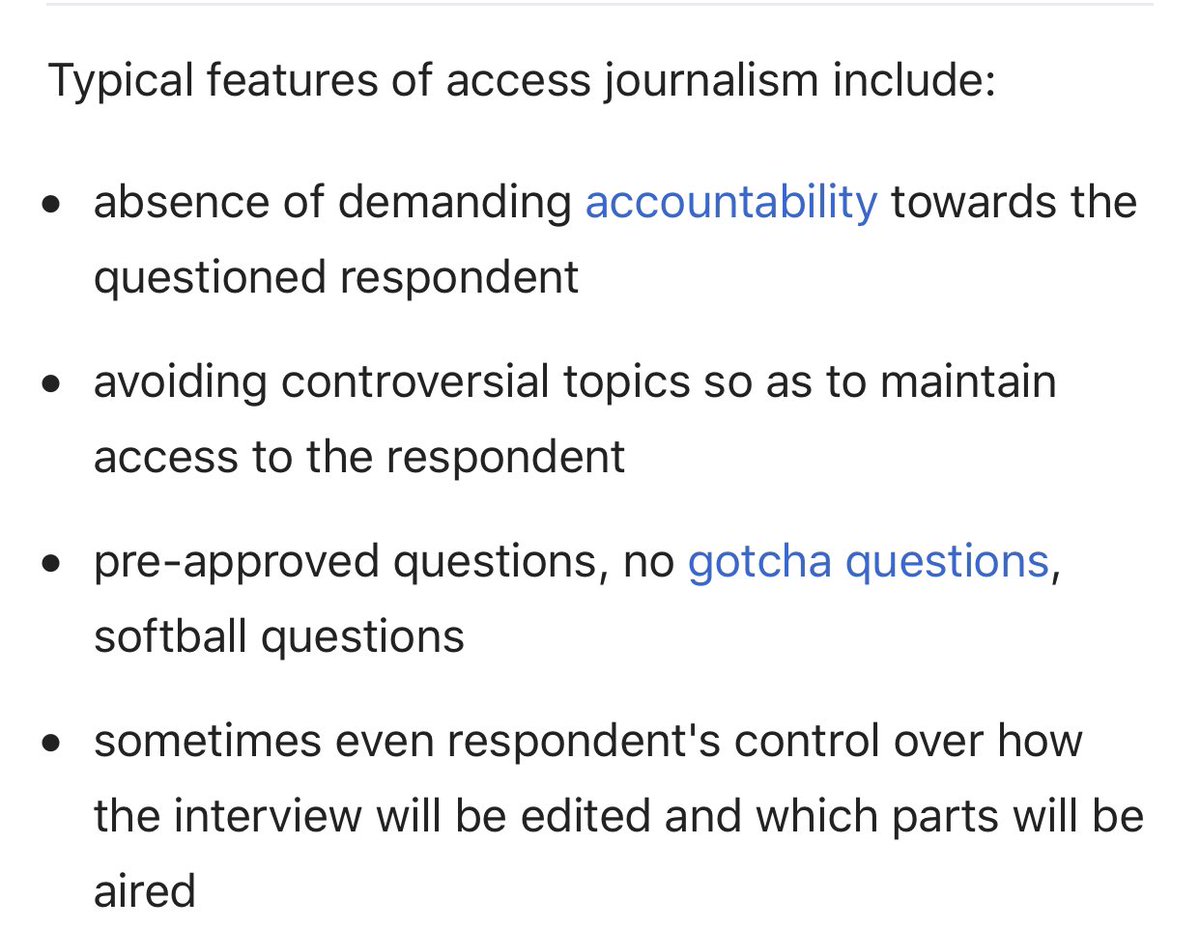1. We see far too much access journalism in Mississippi. Traditionally, what most has been here. The state still suffers from it in notable ways, which has really come out during #covid_19 coverage here. BTW, emailing questions in advance is one form: https://en.wikipedia.org/wiki/Access_journalism">https://en.wikipedia.org/wiki/Acce... https://twitter.com/adamdavidson/status/1247515133347270657">https://twitter.com/adamdavid...
3. Of course, fetishizing interviews with perceived powerful and not seeking responses or factchecking what they tell you. Being overly chummy with their spokespeople and, certainly, being ones they call to spin stories in follow-ups after reports reveal their weaknesses.
4. Leaving out vital details that might make them look bad like not reporting that, say, an elected official just got an award from a public education group without mentioning that it supports vouchers or a secession leader without mentioning slavery.
5. Access journalism is a form of self-censorship, and it’s a big part of red-vs-blue horserace reporting in politics: engaging in fun gamesmanship or reporting on who was “more conservative” in a debate rather than focusing on human issues. 2019 elections here was soaked in it.
6. Here’s column I did on the perils of horserace reporting in Mississippi: Mississippians deserve better than politics-as-a-game: https://m.jacksonfreepress.com/news/2019/sep/04/editors-note-media-horse-race-election-reporting-s/">https://m.jacksonfreepress.com/news/2019...
7. Bottom line: editors allowing reporters to focus on access to perceived powerful above all else are not serving the public interest. It’s a far easier way to do “journalism,” but it won’t move the needle anywhere in Mississippi but backward.
8. It also makes real journalists’ jobs harder because the officials will just go to those who sugarcoat them, give them questions in advance, ask rambling softball questions, don’t factcheck them or do follow-ups, and are easy, naive receptacles for trash about good journalists.
9. The good thing is that readers notice over time when it becomes too blatant; I’m hearing from so many non-journos who are noticing perils of access journalism in state. It is damaging our state and its people. Mississippi deserves better, tougher journalism in these times,
2. Avoiding tough, needed questions at a press conference is another form access journalism takes, or trying to hide a tough question in long rambling questions is another. Just ask the damn question and Shut the Hell Up (I call it STHU to students). No yes-or-no questions please
10. Ultimately, access journalism allows powerful to dictate what covered, how, when, if. All Mississippi media should support each others’ efforts to do real journalism, not bolster attempts to divide to gain access, scoops—especially during a pandemic. Ask the hard questions.
11. What has happened for years in Mississippi is officials (state, local) pick their friendly reporters who don& #39;t ask hard questions and feed PR to them, even about enterprise work by other journalists they refused to respond to. It& #39;s a strategy to marginalize good reporters.
12. Really starting with Haley Barbour (a master manipulator of media, of course), GOP officials just stopped doing most interviews unless handpicked through friendly reporters. They usually demand questions and release statements based on them, which is antithetical to 1st Amend
13. That means elected official isn& #39;t speaking for self, but by committee of handlers when sends "answers." Also since Barbour, better, non-access journalists just get shut out and belittled to marginalize us. Sadly, more Dems have picked up on these bad habits in recent years.
14. Another fun trick is for politicians to play media against each other without journalists know what& #39;s happening. A court transcript of texts showed that an elected Dem did this in Hinds to lure in a young reporter by badmouthing me (because we& #39;d done tough reporting on him.)
15. It then showed in open bias of the reporting. Again, it is the editor& #39;s job to make sure their journalists know to expect these kinds of games. Journalists don& #39;t have to like other journalists not to allow themselves to be played by politicians.
16. Journalists cannot allow officials to sway the truth of their own reporting because (a) someone else reported it first (just build on and add to it) (b) or out of pettiness toward other journalists, which Mississippi is eaten up with. Editors must lead reporters past such.
17. Sure, competitive fire can help drive reporters to go extra mile, but ultimately the best journalism that makes impact on community is not "breaking"; it is deeper, fearless and says to hell with access journalism. The state and our people are more impt than who likes you.
18. Being liked, chummy w powerful for easy stories cannot be good journalists& #39; top priority. I tell reporters to toughen skin (esp if not white guy) bc many will despise you when you do great reporting. Many will later come around and like you anyway, but that cannot be goal.
19. BTW, what happens too often in Mississippi is media will either (a) ignore big story broken by another outlets so they (b) don& #39;t have to follow ethics and credit/link to that outlet or (c) what a while, spin the story and then act like they thought of it. This is useless.
20. Finally: We are here to work with, help, collaborate with all media in state who don& #39;t fall into access-journalism trap and don& #39;t help politicians tear down our work or spread false rumors about our staff members. (Yes, it happens.) A pandemic is time to rise above pettiness.
21. The people of Mississippi deserve good media now more than ever.

 Read on Twitter
Read on Twitter


